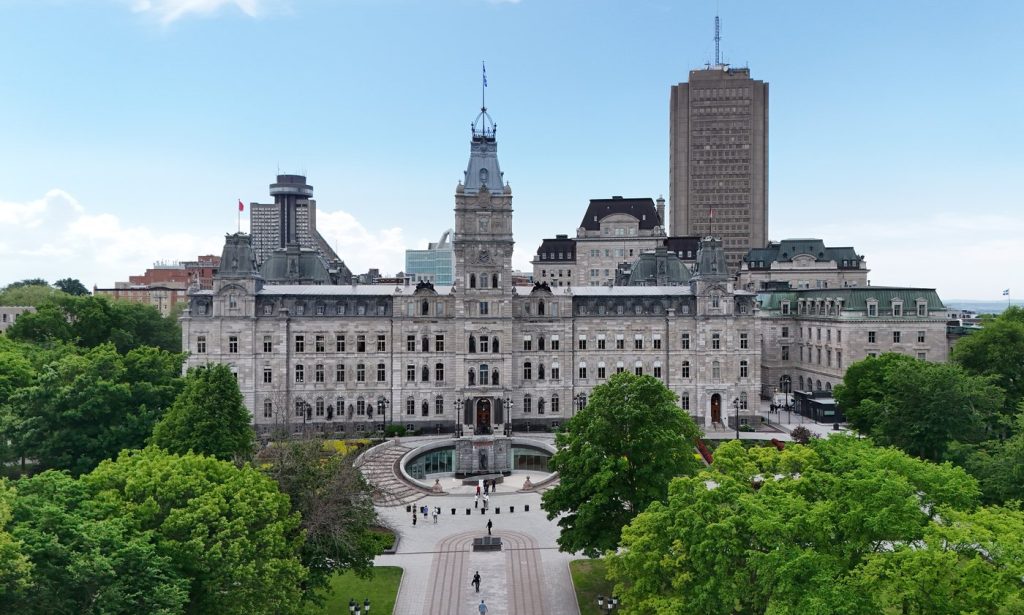Quebec suspends most new international adoption applications over trafficking concerns

Posted January 5, 2025 11:56 am.
Last Updated January 5, 2025 3:17 pm.
Some Quebecers are facing uncertainty over international adoptions following the Quebec government’s decision to suspend most new international adoption applications due to human rights and trafficking concerns.
Quebec’s decision is part of a global “culture change” in recent years as countries have become more aware of serious shortcomings in the way many adoptions are carried out, according to Anne-Marie Piché, a professor in the social work department at Université du Québec à Montréal who studies adoption.
Piché says that this is not the first time we have observed a ban on international adoptions in Quebec.
“It does depend on the country of origin. However, since the beginning of international adoptions in Quebec, Quebec has had multiple agreements with various countries and regions around the world. At times, these needed to be stopped for reasons related to the protection of children’s rights under the Hague Convention, such as natural catastrophes. We can only think of the hard quake in the ’80s. We can think of other events, wars, or situations that make vulnerable children even more vulnerable to being separated from their parents,” she explained.
“It is not the first time; however, this time I feel that it is more due to a major change in mentality and the realization that we are still limited in our protections, in our guarantees, and their applications to make absolutely sure that all international placements involving Quebec or other countries are absolutely safe for children.”

Piché says she doesn’t know all the details of why this is happening now, but in her opinion, it seems to be an accumulation of various incidents.
“We are facing devastating reports, notably in France, about the involvement of various governments, whether they knew it or not, in illicit adoptions. So this is making all countries feel, I guess, more vulnerable, also to make sure that they are better positioned and that they are more ethical in their ways to realize adoptions when they are involved,” she said.
“There is a general increasing awareness. There are many reports. There are also many countries closing as of now, as in the last years. For example, the Netherlands has completely closed international adoptions due to mediatized scandals and the politicization of many adopted individuals who are discovering, in some cases—not all—that they have probably been illegally adopted or that their documentation was falsified. So, there is a general worldwide movement. I think this is more related to Quebec’s position to be careful right now,” she added.
She explained that she supports the decision.
“I think it’s okay. I think it is the right decision. We need to be more careful. Why do we need to be more careful? We have had these concerns for years, for example, about the lack of sufficient rigor in countries of origin, in various agencies or organizations involved, and in individuals participating in adoption processes. We have always thought that, yes, guarantees could be sufficient because, after all, these children are getting permanent families. But we do try to control our end with very strict regulations, especially since Quebec’s ratification of the Hague Convention in 2006. It has been the case for Canada in general since the late ’90s,” said Piché.
“Still, we were still accepting too many instances of files being sent without essential information about the child’s identity, about the child’s history, reasons for placement and parents’ identities. This is a complex question and it is also very limited and keeps being limited. Also, Quebec is making some important movement in addressing this concern because many countries, most countries of origins are still hiding the child’s identities for the preservation of deep mentalities of shame and secrecy about adoption, also for difficulties in proper archiving of the children’s files, of documentation of their life story. And this is actually very important.”

A statement from Marie-Claude Lacasse, Media Relations Coordinator at the Ministry of Health and Social Services, reads:
It’s a difficult decision. In recent years, however, a number of problems have arisen in intercountry adoption cases, including incomplete files, abnormally long delays, unjustified separation of siblings, lack of cooperation from central authorities in certain countries, and more.
As a signatory to the Hague Convention, Quebec is committed to ensuring that adoptions take place in the best interests of the child and with respect for his or her fundamental rights, and to doing everything in its power to prevent the abduction, sale or trafficking of children.
In the current situation, Quebec does not believe it has sufficient guarantees to fulfill its commitments.
As mentioned above, Quebec believes the current situation in intercountry adoption does not provide sufficient guarantees that everything is being done to prevent illicit practices.
It is necessary to suspend new applications and take this time to conduct a detailed assessment of international adoptions and formulate recommendations to strengthen the Quebec framework, prevent illicit practices, and modernize the process.
People who already have an open file can continue with their process. Those affected are individuals who were considering an international adoption but had not yet opened a file. We are aware of the impact of this decision on future adoption applicants and are very sensitive to their situation. These decisions are not made lightly.
We will work to provide them with the necessary support. It is also possible that these individuals will be directed to other projects (e.g., adoption through the Quebec mixed adoption bank).
The exact duration of the moratorium has not yet been determined.

“We are now becoming much more conscious as a society about the importance of adopted people’s identity development, about knowing where they’re from and about allowing them the access as soon as possible to their full histories. And this is still not being done. And I’m quite sure that the Quebec government wasn’t satisfied enough about that aspect coming from countries of origins and their arrangements,” said Piché.
Quebec says it is following jurisdictions around the world that have decided to limit or review international adoptions, including France, the Netherlands, and Denmark. Countries that once sent children overseas for adoption, such as China, have also decided to restrict the practice.
The Canadian government says on its website that all provinces and territories have suspended adoptions from certain countries, including Georgia, Guatemala, Liberia, Nepal, and Ukraine.
“We are sending a message definitely that we do care about children’s identities and about the ethical considerations that are absolutely essential in each and every one of these adoption processes. This is definitely not about giving children to parents who are desiring a child. It is about reflecting much more deeply about all the various needs and interests for every child with their unique situations,” said Piché.
“We are also sending a message about adoptions being the last resort, especially when they are international. That countries should also show more willingness to properly support the most vulnerable families, especially with deep financial inequities, cultural aspects involving support to single mothers, etc. Countries of origin do need to do their homework much more.”
“It is a complex issue. It has been a longstanding issue we are discovering more and more, yes, the potentially very interesting benefits of adoption for children. They have actually been demonstrated for many years in terms of their developmental recuperation, in terms of finding belongingness also in their new families, whether it’s local or international. However, more and more adopted adults are discovering the importance of finding their roots, of having access to their documents, and we do need to listen to them much more to make them part of the conversation and have that part of their rights be respected for the next adoptions to come.”
–With files from The Canadian Press








